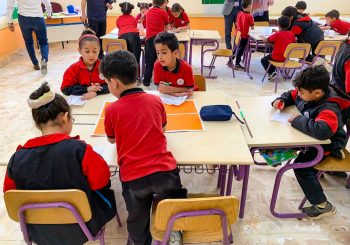Tens of thousands of Palestinians fleeing the war in Gaza arrived in Egypt within the last two years, clutching stamped visas, papers that offer shelter but little else. As they try to establish new routines in their new refuge, guarantees of stability feel like a distant hope.
“We watched in horror the war, destruction, and devastation that took over Gaza,” Nael Youssef Abzaanin, a 42-year-old Palestinian father of three boys, told Egyptian Streets, safely from his apartment in Cairo. “Nothing was spared, not even the trees or stones.”
Abzaanin came to Egypt in late September 2023 with his son, Youssef, for a follow-up on the back surgery Youssef had a year earlier. As Gaza was bombarded and demolished, he thought of his two other sons and wife back in Gaza, yearning to reconnect with them. Meanwhile, his relatives in Egypt arranged an apartment for him and his son.
“As the days dragged on, the situation worsened and my worries and fears grew,” he shared. “The sound of bombing never stopped, and my family in Gaza couldn’t enjoy a single peaceful night’s sleep.”
To this day, Abzaanin remains in Egypt with his son, cut off from his family, with no means of communication, while they remain stuck amid war, living in fear, hunger, and siege.
Matters got even more dire for Abzaanin when financial transfers stopped due to the destruction of banks and the severe shortage of money inside Gaza.
Arriving mostly on short-term tourist visas, Palestinians in Egypt receive 45-day tourist visas that bar them from seeking residency, opening bank accounts, or applying for work or school. For most in Egypt, permits that long since expired ban them from applying for visas to other countries.
“We can’t receive any money transfers from abroad unless we have residency status,” Abzaanin said, noting that he does not have a permit. “Even phone lines get cut off after six months if you don’t have a permit, which makes daily life even harder.”
Finding a job is “nearly impossible,” he shared. Due to legal complexities, Abzaanin can not get employed or a business license to operate a small business.
The Egyptian job market, already strained by inflation of 11.7 percent in September 2025, offers limited opportunities for foreign workers. Many Palestinians resort to informal labor, such as tutoring, translation, or online freelance work, to sustain their families, often at wages below the national average.
Similarly, Youssef, a 15-year-old, could not enroll in school. Egyptian authorities demand residency documents before children can enter public schools, which is a condition many refugee and asylum-seeking Palestinian, Syrian, and Sudanese families cannot meet, according to a diplomatic source in Egypt.
Lacking a valid permit, many children lag behind their Egyptian peers academically and are forced to turn to remote learning options offered by the Palestinian Ministry of Education or to informal home schooling, unable to access educational resources fully.
With the support of the Palestinian embassy in Egypt and in partnership with the International Islamic University of Science, Youssef enrolled in the World Islamic Sciences & Education University (WISE) School Platform, a remote learning program launched in November 2024 to support Palestinian students.
“We are here in Egypt, our second homeland and the land of dignity and honor,” Abzaanin shared, noting that while the Egyptian people treat them as brothers, “with love, honesty, trust, and openness to cultural differences,” the legal dealings are difficult for everyone.
“We live with no work, no income, no stable source of livelihood or prospects,” he said.
Abzaanin’s experience is one of many, echoed by other displaced Palestinians who continue to face similar hardships.
Qasem Raed Al-Kafarnah, a 27-year-old Palestinian man, arrived on 9 October 2023 alone. Six months after he set foot in Egypt, his sister and her children, aged between two to 15, joined him. Since then, he has married a Palestinian woman in Egypt, yet his life remains unstable.
“I still haven’t found a job,” Al-Kafarnah told Egyptian Streets, noting that he has no residency permit to apply for formal work. “The ones available just don’t pay enough.”
While organizations such as the United Nations Relief and Works Agency for Palestine Refugees in the Near East (UNRWA) and the Egyptian Red Crescent offer some help to Palestinian families in Egypt, mainly with medical care, food, and emotional support, limited funding and strict legal rules have kept that aid small and uneven.
These challenges extend to his nieces and nephews, whose education has also been disrupted. They initially studied online with UNRWA, but now they are enrolled at Dawood School, run by the Al-Falah Benevolent Society, a Palestinian non-governmental organization.
“The children have not yet adapted to life in Egypt and wish to go back home,” Al-Kafarnah said, noting that life in Egypt feels like a temporary chapter in their story.
Mirroring his sentiment is Mai Khader Sammour, a 35-year-old Palestinian woman and English teacher. While she appreciates Egyptians’ kindness and hospitality, her heart longs for Palestine.
She arrived in Egypt in February 2025 with her son, Moatasem, who suffers from an autoimmune disease, through a medical referral under the World Health Organization (WHO). Before leaving Gaza, Mai had entrusted her three daughters and son to their father. After her husband was killed, the children found refuge with their grandmother.
Now living in Egypt, Sammour described her life as fairly comfortable, surrounded by warmth, love, and respect from the Egyptian people. Yet, beneath that sense of safety lies a quiet struggle. She has not yet applied for residency, and her attempts to find work have been, in her words, “a very bad experience.”
Sammour faced difficulties trying to enroll her son in school, a process weighed down by paperwork, costs, and the emotional toll of displacement. With no relatives or community nearby, she and Moatasem navigate daily life on their own.
“My son has not adapted to life in Egypt yet,” she said. Through three weekly doctor visits and the unfamiliar rhythm of Cairo, Sammour does her best to make everyday life feel normal, though her heart remains divided between her child beside her and the four waiting for her in Gaza.
As of January this year, Palestinian families seeking to enter Egypt have been required to pay around USD 1,000 (EGP 47,558) for security clearance—a price she can not pay for her other children.
While nearly 115,000 Palestinians fled to Egypt since the start of the war, the Palestinian embassy in Egypt estimates, Palestinian families show resilience and hope.
Egypt remains a temporary refuge, promising safety and a base from which to one day return home. However, without more accessible pathways to education and employment, the challenges of displacement continue to weigh heavily on their futures.
“I wish Egyptians would consider the financial, psychological, and social circumstances the Palestinian people are going through,” Sammour told Egyptian Streets, hoping there would be more job and educational opportunities for Palestinians.
“We live through complicated and difficult circumstances, but we always say, ‘Praise be to God in all situations. If God is with us, who can be against us?’” Abzaanin said.







Comments (0)